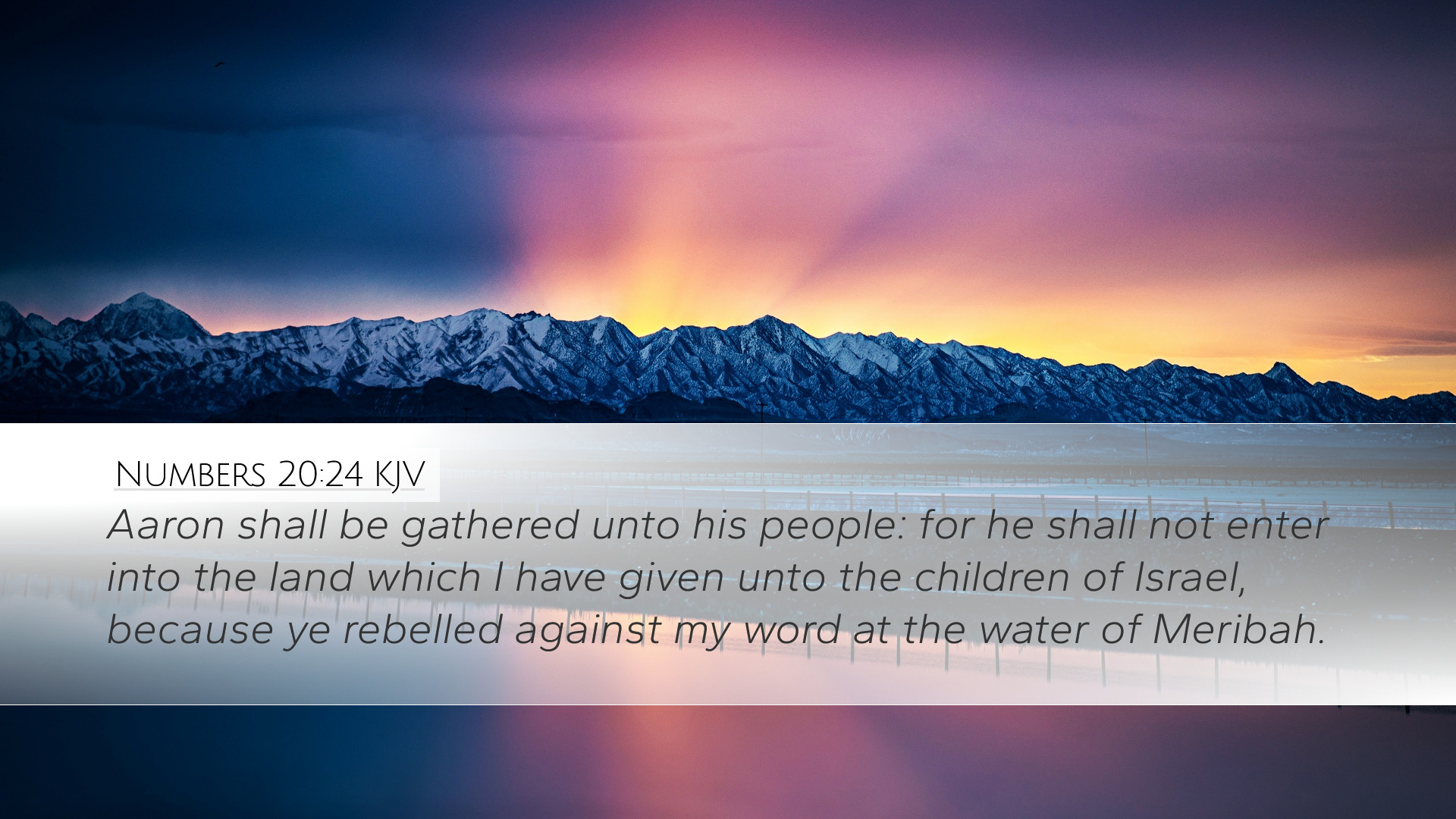Commentary on Numbers 20:24
“Aaron shall be gathered unto his people: for he shall not enter into the land which I have given unto the children of Israel, because ye rebelled against my word at the water of Meribah.”
Introduction
The Book of Numbers reflects the journey of the Israelites through the wilderness. Chapter 20 is pivotal, detailing the death of Miriam, the sin at Meribah, and the consequential judgment upon Aaron. Numbers 20:24 marks a significant moment in the narrative, emphasizing themes of leadership, accountability, and divine judgment. The insights derived from classic commentaries provide a deeper understanding of the text and its implications for its initial audience and contemporary readers.
Contextual Background
This passage occurs during Israel's prolonged wanderings in the desert, shortly before they are to enter the Promised Land. Aaron, as the high priest, has played a critical role in Israel's spiritual leadership. However, due to the rebellion of the people and specifically his own disobedience, a severe consequence awaits him. This verse summarizes both the finality of Aaron's life and God’s justice.
Insights from Matthew Henry
Matthew Henry notes that Aaron’s being “gathered unto his people” indicates a peaceful and honorable death, reflective of the faithful servant of God. As he examines the reasons for Aaron’s exclusion from the Promised Land, Henry emphasizes the seriousness of rebellion against God. He reflects on the gravity of Aaron's sin at Meribah—when struck the rock in anger rather than speaking to it as commanded, indicating a lapse in trusting God’s word. This act not only represented a personal failure but also a misrepresentation of God’s holiness to the people.
Henry further comments on the communal aspect of Israel’s journey, reminding readers that the actions of leaders directly impact the community. Consequently, Aaron’s punishment serves as a warning, portraying the significance of obeying God’s commandments not just for personal righteousness but for the welfare of the entire congregation.
Contributions from Albert Barnes
Albert Barnes, in his commentary, brings attention to the notion of “gathering to one’s people.” He discusses the implications of death for a leader and how it symbolizes transition into a different realm, where one is reunited with ancestors, signifying hope for the faithful. Barnes underlines that God’s judgment on Aaron was rooted in the specific act of rebellion which transferred not just a consequence of no entry into the land but also a clouding of his life’s work and legacy.
Barnes also emphasizes that this moment is not just the end for Aaron, but a pivotal point for the Israelites as they prepare for new leadership and a renewed covenant with God. This transition highlights the need for continuing faithfulness among successors and the importance of maintaining conviction in God's promises, underlining God’s sovereignty even in moments of judgment.
Reflections from Adam Clarke
Adam Clarke provides a theological lens focusing on the significance of Aaron’s failure. Clarke underscores how Aaron’s action reflected a deeper spiritual malaise—misrepresenting God’s character to the people by not adhering to the divine directives. His commentary raises important discussions regarding the nature of divine judgment and grace.
Clarke illustrates that while Aaron was given a noble role among God’s people, he was not immune to sin. This serves as a sobering reminder to all leaders that the grace granted to fulfill their role does not absolve them from accountability. His emphasis extends to the broader community that tends to overlook personal failings when leaders falter, which can lead to collective consequences.
Theological Implications
This verse presents profound theological reflections on sin and divine judgment. The narrative illustrates that divine judgment is not merely punitive but instructive, meant to correct and draw a deeper line of trust and obedience among the people. The fact that an esteemed leader like Aaron faced such severe consequences serves as a cautionary tale about the seriousness of sin, especially in leadership roles.
From a pastoral perspective, it emphasizes the need for self-examination, reminding leaders to remain steadfast in their spiritual commitments while fostering an environment of accountability and grace within the church community.
Applications for Contemporary Readers
- Leadership Accountability: Recognizing that leaders must live in accordance to God’s law and example.
- Understanding Divine Justice: Emphasizing that God’s justice is always paired with mercy and serves to refine faith.
- Community Reflection: Considering the impact of leadership failures on the wider community’s spiritual journey.
- Rebellion Against God: Addressing personal and corporate rebellion and the importance of obedience in our daily lives.
Conclusion
The timeless lesson in Numbers 20:24 implores us to reflect on the consequences of rebellion and highlights the nature of God’s justice and grace. The insights from Matthew Henry, Albert Barnes, and Adam Clarke guide contemporary believers towards a richer understanding of scripture, reminding us that our actions carry weight, particularly in positions of influence. It is a call to steadfastness in faith and a commitment to living according to God’s word.


